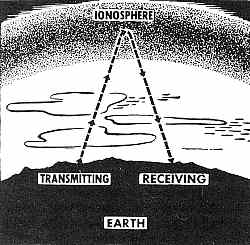|
In 1940 when the Battle of Britain took place England's defensive chain of Radar stations, largely of their own development, enabled its small air force to always be on hand when the enemy arrived. In 1942 when the V-boats were sinking Allied shipping at the rate of 16,000 tons a day, Radar, carried by both airplanes and ships, helped turn the tide, and it was of equal value in the Pacific.  To date Radar and War have been closely linked but many prophecies have been made for peacetime applications. It has proved itself a very valuable aid to air and sea navigation in bad weather, night or fog. It will undoubtedly contribute to a more rapid development of television and other ultra short wave applications. We can only speculate on what other part it will have in future products. |








